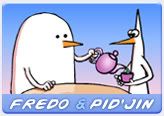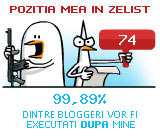Din habauceala de halaudeala cvasi-aleatorie specifica datului pe Internet, din cauza de datorita gratzie Tapirului, am ajuns la un doctor de cap care scrie in limba engleza si scrie bine si scrie amar. Cinic, deci realist.
De mult, de secole, poate chiar de trei saptamini si restul zile :p, n-am mai simtit asa un fior de apreciere pentru cineva care injura Internetul folosind Internetul.
We are doomed. We belong dead. We messed it up, we fubared it horrendously, but with style, and then we post it online.
Aaaargh! I need a glass of water. With stricnine.
:blink:
* * *
The Atlantic asks, Is Google Making Us Stupid?. Just asking: could the real culprit be The Atlantic?
Nicholas Carr says Google is, because along with the massiveness of the available information comes an avoidance-- or simply lack of time-- for contemplation and concentration. Or, to borrow a metaphor (I can't remember who said it) such knowledge is a "mile wide and an inch deep." [...]
Carr also finds he is less able to read deeply, to concentrate; and he can't read novels anymore. It's changed not just what he knows, but how he thinks. He thinks in internet-style.
I'll generalize: it has changed how most people think.
[...]
So the internet allows the delusion that you know things that you really don't; the mistake that the thoughts you do have are your own, and not someone else's; and then changes the way you think, reinforcing this style of thinking.
[...]
"Kids today" may be the Dumbest Generation, but the parents and teachers of the Dumbest Generation are themselves so dumb they not only don't know the information themselves, they don't even know what knowledge exists that is important to pass on.
[...]
Simply put: adults today don't know what's important to know. So they make things up to care about.
* * *
Si aici articolul din The Atlantic de unde porneste furia.
* * *
Is Google making us stupid?
"Dave, stop. Stop, will you? Stop, Dave. Will you stop, Dave?” So the supercomputer HAL pleads with the implacable astronaut Dave Bowman in a famous and weirdly poignant scene toward the end of Stanley Kubrick’s 2001: A Space Odyssey. Bowman, having nearly been sent to a deep-space death by the malfunctioning machine, is calmly, coldly disconnecting the memory circuits that control its artificial “ brain. “Dave, my mind is going,” HAL says, forlornly. “I can feel it. I can feel it.”
I can feel it, too. Over the past few years I’ve had an uncomfortable sense that someone, or something, has been tinkering with my brain, remapping the neural circuitry, reprogramming the memory. My mind isn’t going—so far as I can tell—but it’s changing. I’m not thinking the way I used to think. I can feel it most strongly when I’m reading. Immersing myself in a book or a lengthy article used to be easy. My mind would get caught up in the narrative or the turns of the argument, and I’d spend hours strolling through long stretches of prose. That’s rarely the case anymore. Now my concentration often starts to drift after two or three pages. I get fidgety, lose the thread, begin looking for something else to do. I feel as if I’m always dragging my wayward brain back to the text. The deep reading that used to come naturally has become a struggle.
I think I know what’s going on. For more than a decade now, I’ve been spending a lot of time online, searching and surfing and sometimes adding to the great databases of the Internet. The Web has been a godsend to me as a writer. Research that once required days in the stacks or periodical rooms of libraries can now be done in minutes. A few Google searches, some quick clicks on hyperlinks, and I’ve got the telltale fact or pithy quote I was after. Even when I’m not working, I’m as likely as not to be foraging in the Web’s info-thickets’reading and writing e-mails, scanning headlines and blog posts, watching videos and listening to podcasts, or just tripping from link to link to link. (Unlike footnotes, to which they’re sometimes likened, hyperlinks don’t merely point to related works; they propel you toward them.)
For me, as for others, the Net is becoming a universal medium, the conduit for most of the information that flows through my eyes and ears and into my mind. The advantages of having immediate access to such an incredibly rich store of information are many, and they’ve been widely described and duly applauded. “The perfect recall of silicon memory,” Wired’s Clive Thompson has written, “can be an enormous boon to thinking.”
But that boon comes at a price. As the media theorist Marshall McLuhan pointed out in the 1960s, media are not just passive channels of information. They supply the stuff of thought, but they also shape the process of thought. And what the Net seems to be doing is chipping away my capacity for concentration and contemplation. My mind now expects to take in information the way the Net distributes it: in a swiftly moving stream of particles. Once I was a scuba diver in the sea of words. Now I zip along the surface like a guy on a Jet Ski.
{...]
I’m haunted by that scene in 2001. What makes it so poignant, and so weird, is the computer’s emotional response to the disassembly of its mind: its despair as one circuit after another goes dark, its childlike pleading with the astronaut—“I can feel it. I can feel it. I’m afraid”—and its final reversion to what can only be called a state of innocence.
HAL’s outpouring of feeling contrasts with the emotionlessness that characterizes the human figures in the film, who go about their business with an almost robotic efficiency. Their thoughts and actions feel scripted, as if they’re following the steps of an algorithm. In the world of 2001, people have become so machinelike that the most human character turns out to be a machine.
That’s the essence of Kubrick’s dark prophecy: as we come to rely on computers to mediate our understanding of the world, it is our own intelligence that flattens into artificial intelligence.
Situația la zi, vineri, 16ianuarie
Acum 6 ore





4 comentarii:
Bloody scarry. Chiar mi-e frica de momentul in care NET-ul (cum il numeste chiar autorul) va realiza ca o minuscula entitate pe nume Nicholas Carr face galagie si va lua masuri in acest sens.
Cert e ca mintea mi-a luat-o razna cam de 20 de ori pana la sfarsitul articolului.
Si cel mai probabil e ca viitorul va arata astfel: http://www.imdb.com/title/tt0387808/
(Na, ca am facut misto de net, folosind un hyperlink ;-))
lol. am citit review-ul si m-am distrat. ar fi chiar fain de n-ar fi trist.
pilula albastra sau aia roshie?
raspunsu corect: aia cu nitratzi.
:wink:
Ummm ... Tapirul nu e Vlad, nu?
Ba da. Vlad. Tot timpul am facut confuzie: Vlad. Tapir. Mistretz. Hipopotam. Iliescu. Constantinescu. Basescu. Geoana.
Nu, gresesc. Pe Geoana nu l-am confundat niciodata.
:wink:
Trimiteți un comentariu